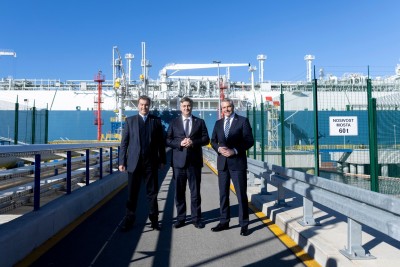Austria Supports Expansion of Croatian LNG Terminal Krk
Croatia wants to expand its terminal for liquefied natural gas (LNG) on the Adriatic island of Krk far beyond its own needs and develop it into a hub for gas supply in the region - gas is also to flow from there to Austria and Germany in the future. At a meeting on Krk, Croatia's Prime Minister Andrej Plenkovic, Austria's Chancellor Karl Nehammer and Bavaria's Minister President Markus Söder agreed to support each other in strengthening energy security, diversifying energy sources and ensuring the security of supply with natural gas and hydrogen.
 Chancellor Karl Nehammer (r.) with Croatian Prime Minister Andrej Plenkovic (m.) and Bavarian Minister President Markus Söder (l.) at the LNG Terminal. / Picture: © Bundeskanzleramt (BKA) / Andy Wenzel
Chancellor Karl Nehammer (r.) with Croatian Prime Minister Andrej Plenkovic (m.) and Bavarian Minister President Markus Söder (l.) at the LNG Terminal. / Picture: © Bundeskanzleramt (BKA) / Andy Wenzel
Austria's Chancellor Nehammer visited Croatia to meet with Croatia's Prime Minister Andrej Plenkovic. However, the actual reason for the chancellor's visit to Croatia was the security of the energy supply. Austria had done a lot to counter its dependence on Russian gas.
Austria had managed to reduce its dependence on Russian gas from 80 to 21 percent, Nehammer said. The fill level in gas storage facilities is currently 95 percent, he said. "Particular to this is diversification, independence from Russian gas. This is only possible if you cooperate and look for new opportunities, which are then developed further," Nehammer said.
"It is impressive what is possible through technology and innovation," emphasized Chancellor Karl Nehammer during a press briefing held with Croatia's Prime Minister Andrej Plenković and Bavaria's Minister President Markus Söder on the island of Krk, referring to the LNG liquid gas terminal presented there.
According to Plenkovic, the capacity of the LNG terminal on Krk of 2.9 billion cubic meters of gas per year would already be sufficient to cover the gas needs of Croatian households and industry. Nevertheless, this year in August, it was decided to expand this capacity to 6.1 billion cubic meters to inject gas from there into the European natural gas networks.
Croatia's Prime Minister Andrej Plenkovic intends to seek co-financing from the EU and, according to Federal Chancellor Karl Nehammer, can also count on support from Austria.
At the European Commission, Nehammer and Söder intend to lobby for financial support for these projects within existing programs such as Connecting Europe Facility (CEF) or REPowerEU.



